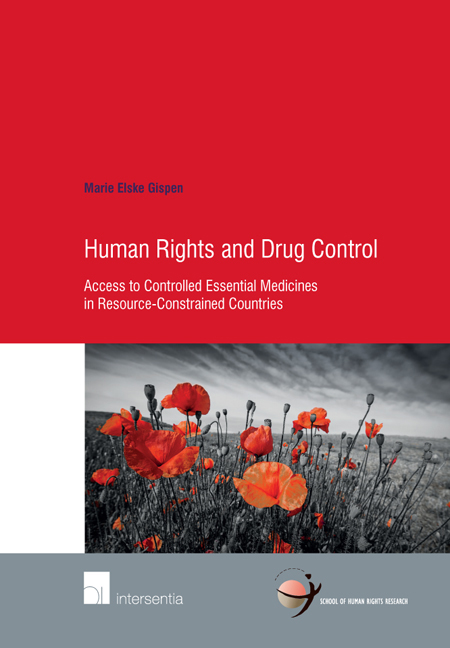 Human Rights and Drug Control
Human Rights and Drug Control Book contents
- Frontmatter
- Acknowledgements
- Contents
- List of Abbreviations
- Table of Instruments
- Table of Cases
- List of Figures and Tables
- Part 1 Concept and Problem
- Chapter 1 Introduction
- Chapter 2 Access to Controlled Essential Medicines: Context, Background, Framing, and Focus
- Part 2 Normative Framework
- Part 3 Country Studies
- Part 4 Conclusions and Recommendations
- Appendix I Interview Protocol Uganda
- Appendix II Interview Protocol Latvia
- Samenvatting (Dutch summary)
- Selected Bibliography
- Index by Paragraph
- Curriculum Vitae
- School of Human Rights Research Series
Chapter 2 - Access to Controlled Essential Medicines: Context, Background, Framing, and Focus
from Part 1 - Concept and Problem
Published online by Cambridge University Press: 27 September 2018
- Frontmatter
- Acknowledgements
- Contents
- List of Abbreviations
- Table of Instruments
- Table of Cases
- List of Figures and Tables
- Part 1 Concept and Problem
- Chapter 1 Introduction
- Chapter 2 Access to Controlled Essential Medicines: Context, Background, Framing, and Focus
- Part 2 Normative Framework
- Part 3 Country Studies
- Part 4 Conclusions and Recommendations
- Appendix I Interview Protocol Uganda
- Appendix II Interview Protocol Latvia
- Samenvatting (Dutch summary)
- Selected Bibliography
- Index by Paragraph
- Curriculum Vitae
- School of Human Rights Research Series
Summary
Introduction
This book analyses the reciprocity of human rights and international drug-control norms regarding the access to controlled essential medicine provision in resourceconstrained countries. As also stated in the previous chapter, access to medicines such as morphine and codeine for pain and palliative care treatment is the leading example used throughout this study. While Chapter 1 only briefly introduced the topic, this chapter supplies further context, background, framing, and focus. In that capacity, the present chapter provides both the starting point of the normative analysis, i.e. the normative framework, elaborated in Part 2 of the book, and serves to place the relevance of the analysis and results (Chapter 8) in context.
This chapter commences by situating the approach taken in international public law, regardless of any substantive implications (Section 2.2). In doing so, the chapter addresses the current debates on the interpretation of international law and its interaction with different subfields of international law. Following this contextualization, the chapter then widens its (funnel) focus to cover human rights, drug control, controlled essential medicines, and resource-constrained countries. The chapter provides a background to medicines regulation in health systems (Section 2.3) and frames the concept of (controlled) essential medicines (Section 2.4). Subsequently, the chapter addresses the global crisis of pain control medicines as an example (Section 2.5). Ultimately, and more specifically, the chapter elaborates on the relevant aspects of the international drug-control treaties (Section 2.6).
Notably, Chapter 1 already clearly demonstrated that the unavailability or inaccessibility of controlled medication is a serious human rights concern and that States have obligations under human rights law to address the concomitant suffering. Apart from situating the human rights approach elaborated in this book within the ambit of international law, any substantive human rights issues can be found in Part 2 and are not discussed in this chapter.
Context of a human rights approach to drug control in international law
Prior to elaborating the funnel focus in this book, the human rights approach analysed – notwithstanding its substantive implications – is placed into the broader discussion on the integration of different international legal regimes. The section commences with an analysis of international institutional law and its relevance to international human rights and drug-control treaties. Subsequently, it places the approach taken in the context of the ‘fragmentation debate’ and the general rules of treaty interpretation.
- Type
- Chapter
- Information
- Human Rights and Drug ControlAccess to Controlled Essential Medicines in Resource-Constrained Countries, pp. 27 - 74Publisher: IntersentiaPrint publication year: 2017


